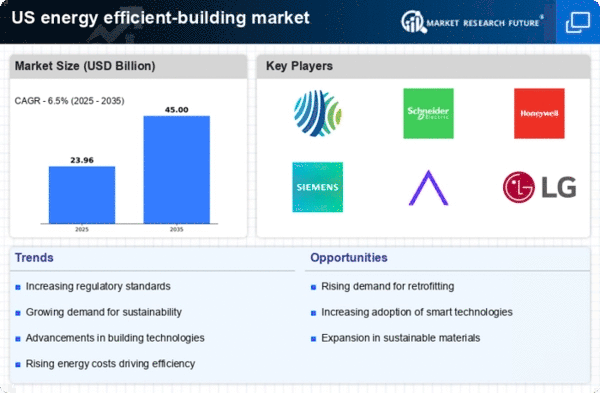Rising Energy Costs
The escalating costs of energy in the US have become a pivotal driver for the energy efficient-building market. As energy prices continue to rise, consumers and businesses alike are increasingly motivated to invest in energy-efficient buildings to mitigate their energy expenses. According to recent data, energy costs have surged by approximately 15% over the past five years, prompting a shift in focus towards energy-efficient solutions. This trend is particularly evident in commercial real estate, where energy-efficient buildings can yield savings of up to 30% on energy bills. Consequently, the energy efficient-building market is likely to experience robust growth as stakeholders seek to reduce operational costs and enhance their return on investment.
Technological Advancements
Technological innovations are playing a crucial role in shaping the energy efficient-building market. The integration of advanced building technologies, such as smart thermostats, energy management systems, and renewable energy sources, is enhancing the efficiency of buildings. For instance, the adoption of smart technologies has been shown to reduce energy consumption by up to 20%. Furthermore, the development of energy-efficient materials, such as insulated concrete forms and energy-efficient windows, is also contributing to the market's growth. As these technologies become more accessible and affordable, the energy efficient-building market is likely to witness increased adoption, leading to improved energy performance in both residential and commercial sectors.
Consumer Awareness and Demand
There is a growing awareness among consumers regarding the environmental impact of traditional building practices, which is significantly influencing the energy efficient-building market. As more individuals prioritize sustainability, the demand for energy-efficient buildings is on the rise. Surveys indicate that approximately 70% of homebuyers in the US express a preference for energy-efficient features, such as high-performance insulation and energy-efficient appliances. This shift in consumer behavior is compelling builders and developers to incorporate energy-efficient designs and technologies into their projects. As a result, the energy efficient-building market is poised for expansion, driven by the increasing consumer demand for sustainable living options.
Government Regulations and Standards
Government regulations and standards are increasingly influencing the energy efficient-building market. In the US, various federal and state initiatives aim to promote energy efficiency in buildings. For example, the Energy Policy Act mandates specific energy efficiency standards for new constructions, which has led to a surge in compliance among builders. Additionally, the implementation of the Energy Star program encourages the adoption of energy-efficient practices by providing certification for buildings that meet stringent energy performance criteria. These regulatory frameworks not only drive the demand for energy-efficient buildings but also create a competitive advantage for developers who prioritize compliance. Consequently, the energy efficient-building market is expected to grow as regulations become more stringent and widespread.
Investment in Green Building Projects
The increasing investment in green building projects is a significant driver for the energy efficient-building market. Investors are recognizing the long-term benefits of energy-efficient buildings, including lower operating costs and higher property values. Reports indicate that green buildings can command rental premiums of up to 10% compared to traditional buildings. This trend is further supported by the growing interest from institutional investors who are prioritizing sustainability in their portfolios. As more capital flows into green building initiatives, the energy efficient-building market is likely to expand, fostering innovation and the development of new energy-efficient technologies and practices.
















